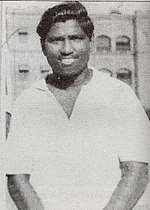Sheoo Mewalal
Sheoo Mewalal (also known as Sahu Mewalal; 1 July 1926 – 27 December 2008) was an Indian Olympic footballer who plied his trade in Kolkata. He played as a striker and was known for his excellent fitness, bicycle kicks, and goal-scoring abilities, especially using the rabona kick. [1]
 | |||
| Personal information | |||
|---|---|---|---|
| Date of birth | 1 July 1926 | ||
| Place of birth | Daulatapura, Bihar, British India | ||
| Date of death | 27 December 2008 (aged 82) | ||
| Place of death | Kolkata, India | ||
| Playing position(s) | Striker | ||
| Youth career | |||
| Morning Star Club | |||
| Napier Club | |||
| Senior career* | |||
| Years | Team | Apps | (Gls) |
| 1938–? | Khiddirpore Club | ? | (?) |
| 1945–1946 | Aryans Club | ? | (?) |
| 1946–1947 | Mohun Bagan | ? | (?) |
| 1947–1955 | Eastern Railway Football Club | ? | (?) |
| 1956–1957 | Aryans Club | ? | (?) |
| 1958 | Bengal Nagpur Railways | ||
| National team | |||
| 1948–? | India | ? | (?) |
| * Senior club appearances and goals counted for the domestic league only | |||
Childhood and early career
Mewalal was born on 1 July 1926 in Daulatpur in Chitarghati Panchayat of the Gaya district (now Nawada district) in Bihar, to Sahoo Mahadeoram and Kusumi Devi. He spent his early days playing football with the seeds of a tar tree near the banks of the Khuri River, which flows through his village.[2]
In 1937 his family moved to Calcutta (now Kolkata). His father worked at Fort William, and the family resided in the Fort William and Hastings neighborhoods. Once in Calcutta, Mewalel's footballing talent was noticed by Sergeant Barnett who helped him join the Morning Star Club. Barnett would become his first coach. Known for his ability to shoot with both feet, Mewalal credited Sergeant R. Blackey for helping him learn the technique.[3] He began playing as a right-in and was eventually urged by the club to play in the center-forward position, considering his physique and ball-shooting technique. He began playing for the Napier Club the following year. He made his name at the club after scoring an important goal in a draw against Grear Sporting Club.
Club career
Mewalal started his senior career in 1938 with Khiddirpore Club which was then playing in the 2nd Division of the Calcutta Football League.[4] He came into the limelight in 1944 when he scored the winning goal for the IFA XI against India XI.[1] In 1945 he joined the 1st Division club Aryans. It was his hat-trick for Aryans in the same year against Mohun Bagan A.C. in a Calcutta league match that impressed the then Mohun Bagan captain Sailen Manna. In 1946 he joined Mohun Bagan under Manna. In 1947 he joined the Eastern Railway Football Club. After spending eight years with them, he joined BNR Football Club.[1] In 1958, while playing in an Inter-Railway tournament in Kharagpur, he broke his knee. This incident ended Mewalal's illustrious 20-year career.[4]
During his club career, Mewalel scored more than 150 goals in the local league. He also scored 39 goals—including five hat-tricks—for BNR in the Santosh Trophy competition. Mewalal was the top scorer in the Calcutta Football League on four occasions. He achieved this feat in 1949, 1951, and 1954 for Eastern Railways and in 1958 for BNR. He also scored a record of 32 hat-tricks in local football tournaments, a record unbroken to this day.[4]
International career
Playing for the Indian national team, Mewalal's first major tournament was the 1948 Summer Olympics in London. Following the Olympics the team played exhibition games, winning a game against the Dutch club AFC Ajax 5–1. Mewalal emerged as the top scorer in these games. At the inaugural 1951 Asian Games in New Delhi, he finished as the top scorer with four goals, with India winning the gold medal. He scored the winning goal in the 1–0 win against Iran in the final.[3] He was also a part of the team that competed at the 1952 Summer Olympics in Helsinki. He toured several European countries in the late 1940s as part of the Indian team, and also participated in the team's tours of Bangladesh, Afghanistan, Myanmar, and Thailand during the 1950s.[1]
Mewalel was the first player after independence to score a hat-trick for India in a 4–0 victory over Burma in the 1952 Colombo Quadrangular Tournament.[5][6]
Personal life
Mewalal married Laxmi Devi Lal in 1944 when he was 18. They had three children together.
He was admitted to a Kolkata hospital on 14 November 2008 after suffering from pneumonia. Diagnosed with a gallstone, he was again admitted on 8 December and was operated upon on 19 December, after which he was placed on a liquid diet. He died on 27 December.[4]
References
- Goal.com
- "Remembering India's most prolific centre forward - Sahoo Mewalal". sportskeeda.com. 30 October 2012. Retrieved 20 October 2014.
- Sengupta, Somnath (27 December 2012). "Legends Of Indian Football : Sheoo Mewalal". thehardtackle.com. Retrieved 20 October 2014.
- "Sahu Mewalal passes away". The Telegraph - Calcutta. 28 December 2008.
- Dey, Subrata. "India – Record International Players". RSSSF. Archived from the original on 21 March 2019. Retrieved 7 February 2019.
- Chaudhuri, Arunava. "The Indian Senior Team at the 1952 Colombo Quadrangular Cup:". www.indianfootball.de. Archived from the original on 4 March 2016. Retrieved 15 July 2018.
External links
- Sahu Mewalal – FIFA competition record